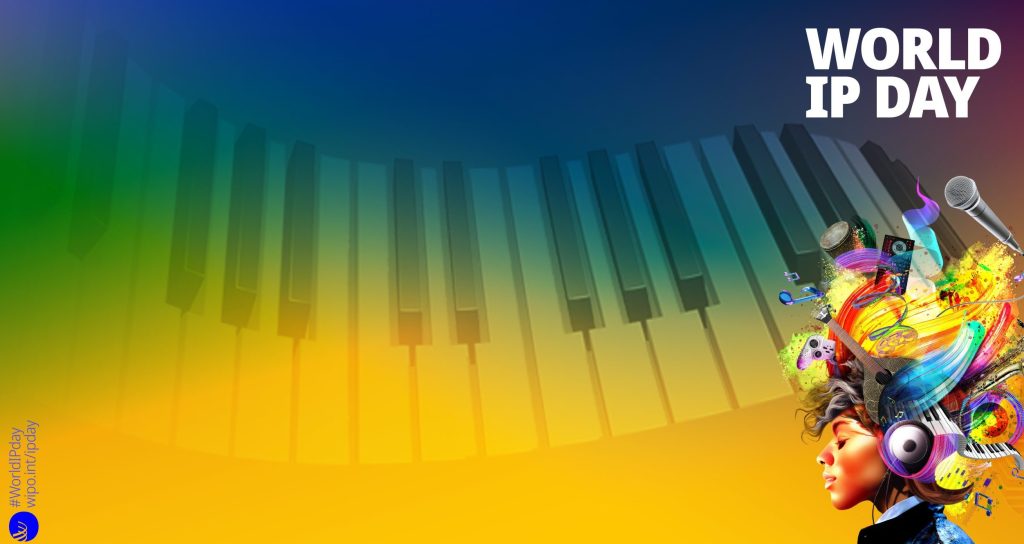World Intellectual Property (IP) Day is celebrated on 26 April every year. The theme for 2025 is “IP and Music: Feel the Beat of IP.”
A recent study by the U.S. Chamber of Commerce highlights the importance of intellectual property in job growth and economic development. As Tom Quaadman, Senior Vice President of Economic Policy at the U.S. Chamber of Commerce recently said, “Intellectual property is the backbone of our economy, driving innovation that benefits consumers…”
To honor World IP Day, we asked IP experts Jacqueline Charlesworth, Partner at Frankfurt Kurnit Klein & Selz, Rick Marshall, General Counsel at The Mechanical Licensing Collective, Nothando Migogo, Director of Sosela Legal & Advisory and Executive Director of the 1020 Group, and Dan Kopko, Deputy General Counsel at CCC, how IP law encourages innovation and creativity, what responsible AI means, and what their favorite song is.
How does IP law encourage innovation and creativity?
Charlesworth: To quote the Supreme Court: “The economic philosophy behind … patents and copyrights is the conviction that encouragement of individual effort by personal gain is the best way to advance public welfare.” I agree with that philosophy.
Marshall: Robust IP laws enable a sustainable creator economy where artists, writers, and creators can be recognized, earn a living, and retain some control over how their work is used and shared.
Migogo: Intellectual property protects and rewards innovators and creators while allowing fair access and inspiration to the greater community, which in turn encourages more innovation and creativity. In a healthy IP ecosystem, the relationship between creation, protection, reward, inspiration, and further innovation leads to a fair and thriving body of knowledge and endless innovation.
Kopko: Intellectual property law, and specifically copyright law, encourages innovation and creativity by giving certain exclusive rights to creators to control what can and cannot be done with their works. Those rights also enable a creator to seek remuneration and require attribution for the use of their works – in other words, it rewards them for their creative outputs. When that incentive system is removed by taking those rights away (such as through overbroad copyright exceptions), it makes it less likely that artists, writers, musicians, and other creators will contribute their creative outputs to society. Who wants to live in that world?
What does “Responsible AI” mean to you?
Charlesworth: It means valuing and rewarding the contributions of human authors to AI systems—and not pretending the systems are not exploiting the human-authored works they train on.
Marshall: “Responsible AI” means striking an equitable balance between advancing tools with the potential to improve everyday life and the essential need to support the rights and livelihoods of the artists, writers, and other creators whose work shapes our culture.
Migogo: “Responsible AI” is grounded in the maxim ‘first do no harm.’ AI is and should be praised for the advancement and development it promises, but it does not exist in a vacuum. The enhancements it promises to our lives and jobs should not come at the cost of the legal rights, such as copyright, economic rights, and the rights to privacy and dignity, which uphold many industries and livelihoods. Responsible AI recognizes that broad-based solutions, such as collective licensing, are necessary for the sustainable protection of rights, which in turn encourages the fair and just growth of the AI industry.
Kopko: “Responsible AI” means ensuring that the access and use of copyrighted works or other IP to train AI or produce outputs is appropriately authorized and aligned with copyright and other laws. This recognizes the value of the works on which the AI depends and is aligned with the incentive system that IP laws establish. Beyond that, it means ensuring that the AI is trained with quality material so that it produces quality, dependable outputs. The best way to do that is to start with quality published material, again circling back to lawful access and use. Appropriate permissions should be sought, and rights holders should be appropriately remunerated and credited for the uses of their works in AI.
Keeping in line with this year’s World IP Day theme for music, what is your favorite song of all time, and what was the last song you listened to?
Charlesworth: I do not have an absolute favorite, but “While My Guitar Gently Weeps” by George Harrison seems appropriate to cite at the moment. It is playing in my head right now.
Marshall: My favorite song varies by the day, but because I am prepping for another run of Dead & Company shows at the Sphere, I will say the Grateful Dead’s 7/8/78 version of “Estimated Prophet” for both!
Migogo: I honestly have many favorite songs! Roberta Flack’s version of “The First Time Ever I Saw Your Face” is definitely in the top 10. The last song I listened to is “Kuye,” a beautiful and deliciously melancholic ballad by South African artist Sjava.
Kopko: Favorite song of all time – impossible to name just one! I am a musician, songwriter, and wanna-be producer, and I love music! If I were forced to choose, as a songwriter, I would choose something like “Strawberry Fields Forever” by Lennon or “God Only Knows” by Brian Wilson, two incredible songwriters at the top of their game. The last song I listened to: “Messy” by Lola Young – happened to be the last song on this morning’s run playlist. She is a brilliant young artist!

